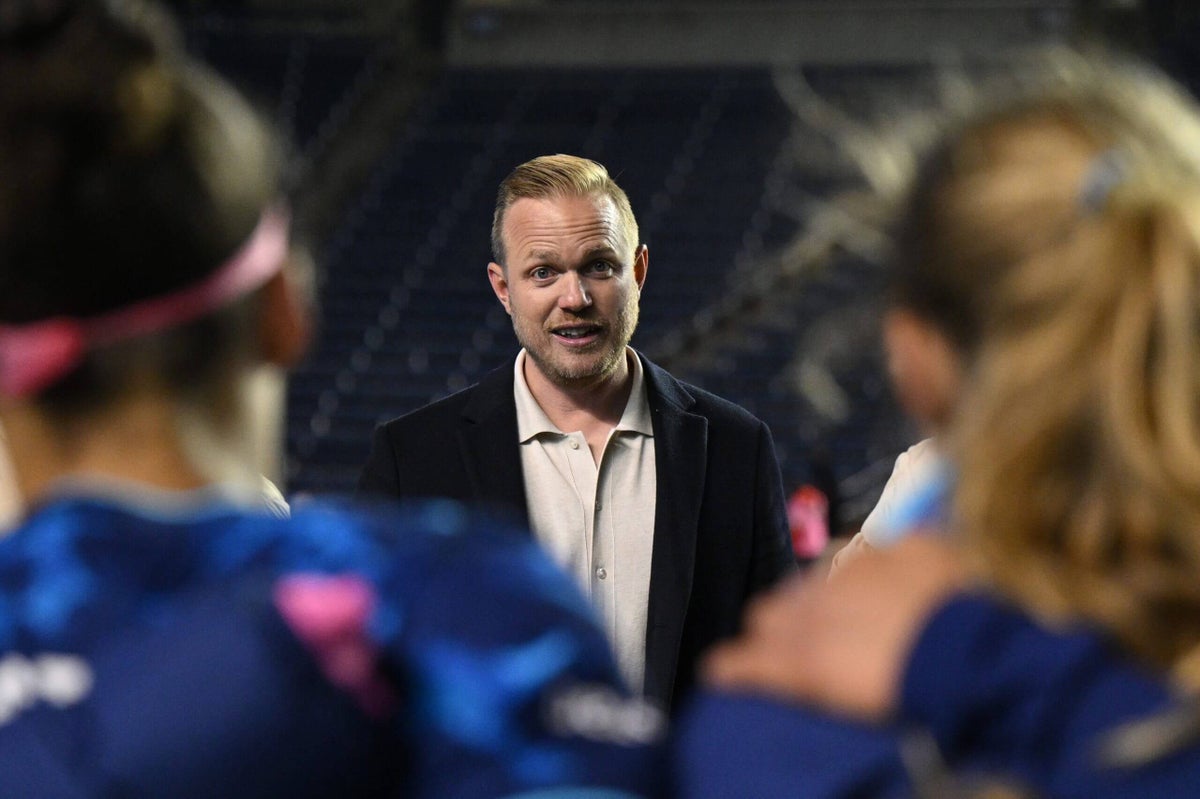SAN DIEGO — Words like “new” and “build” are catnip for a coach in search of a fresh start. Still, Jonas Eidevall needed to see for himself just how blank the slate was with San Diego Wave FC.
The beginnings of an answer took shape when Eidevall pulled up in January to the cluster of blue shipping containers that constitute the administrative side of the NWSL team’s training facility in the sun-baked hills of Del Mar, about three miles away from the ocean.
“I was stepping into my office,” he recalled to The Athletic, “and it was a mess.” He paused. “It just didn’t have anything.”
As in: pens and notepads, an ergonomic desk chair, a functioning printer?
“We were missing a door,” he said, a tiny smirk breaking across his face.
After he resigned from Arsenal in October, Eidevall and his family uprooted themselves from Europe and traveled thousands of miles to this unintentionally open concept office. Even if there had been somewhere to hide, Eidevall didn’t seem interested.
Letting go and embarking on a journey toward building something special, sturdy and sustainable was the point, after all.
The Wave head coach began his career with Lunds, a small club in Sweden, and endeavored to achieve the most with scarce resources. In north London, he was at the helm of one of the best women’s sides in the world, expected to do the most with arguably the most, and quickly.
Now, just over seven months into his tenure with the Wave, Eidevall has found solace in the space and support to progress slowly and loosen his grip on control. And so far, as the Wave sit fourth in the NWSL table and lead the league in both passes completed and goal scorers, the football has been flowing.
“This is my first head coach assignment where I haven’t needed to win from day one, like as a must,” he said. “In Lunds, we had to be promoted from the second division up to the first, and we were successful with that. When I was coaching Malmö (now FC Rosengård) in Sweden, we had to win the championship. Everything else was a failure, even if we were playing against other really good teams as well, but that was the direction from the club.
“It’s the same thing at Arsenal. You need to win, you need to win trophies, otherwise you can’t stay in the job, and that pressure comes from day one.”
At the same time, the Wave’s appointment of Eidevall was a strong statement of intent from a club whose three years in existence had taken a volatile turn last season. Their 2024 campaign was marked by the abrupt firing of head coach Casey Stoney and a revolving door of perplexing hires deployed to triage the situation; Wave concluded their season in 10th, with retired U.S. men’s national team star Landon Donovan as their manager. Front office changes followed in October — Lauren Leichtman and Arthur Levine took over from Ron Burkle as owners, and Cami Ashton Levin, formerly of the Kansas City Current, replaced Molly Downtain as general manager.
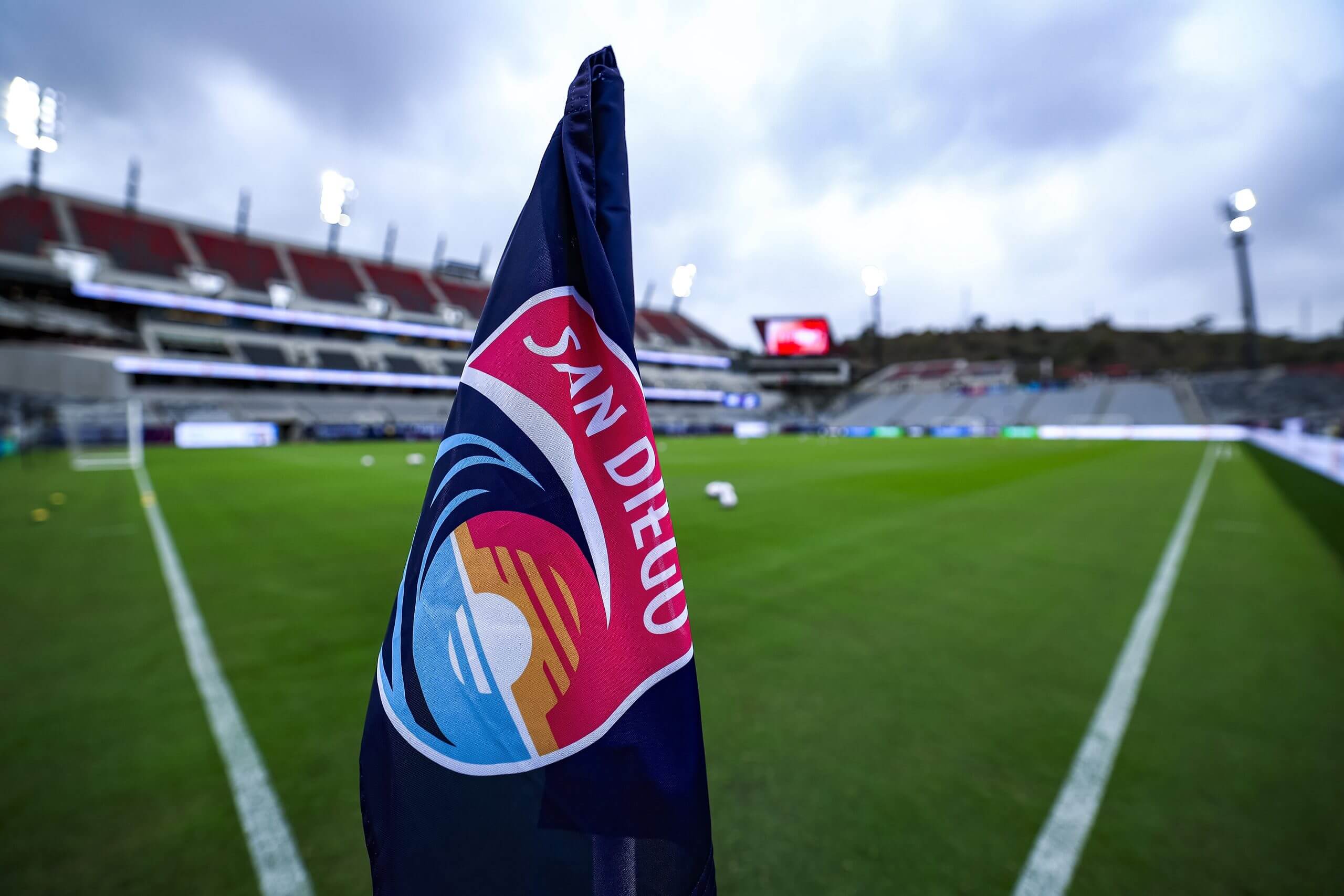
The Wave’s 2024 campaign was marked by the abrupt firing of head coach Casey Stoney (Francisco Vega / Getty Images)
Then there were the player departures — 14 between the start of the 2024 season and now. The exits of the Wave’s U.S. women’s national team players, all marquee signings, cut especially deep. Four months after Alex Morgan announced her retirement from professional soccer and a week after the Wave hired Eidevall, the club traded Jaedyn Shaw to the North Carolina Courage and agreed to a world-record transfer that sent Naomi Girma to Chelsea to compete in the Women’s Super League that Eidevall had just left.
Eidevall was named Arsenal’s head coach in 2021 and led the women’s team to two League Cups in 2023 and 2024, and their first Champions League semifinal in a decade in 2023. Sitting outside the Wave offices before a training session, he described the end of his tenure there as emotional yet brief. A brutal loss to Bayern Munich and another to Chelsea within four days made it impossible to ignore the writing on the wall, but the now-42-year-old knew that he wanted to make a quick transition.
He had followed the NWSL from afar and was drawn to its unique characteristics and the challenges they could present a manager: the salary cap, which helps maintain what he called “a closeness in the table”, the travel to cities far enough away to experience climate change differently, and the jetlag that accompanies it.
Eidevall was also intrigued by what he would not have at the Wave after working for a women’s team affiliated with one of the top men’s organizations in the Premier League. Bolstered by a staff in the ballpark of 40 people meant “you have someone who is prepping everything for you, carrying all the equipment, making sure the balls are here, doing it with uncomfortable hours,” he said.
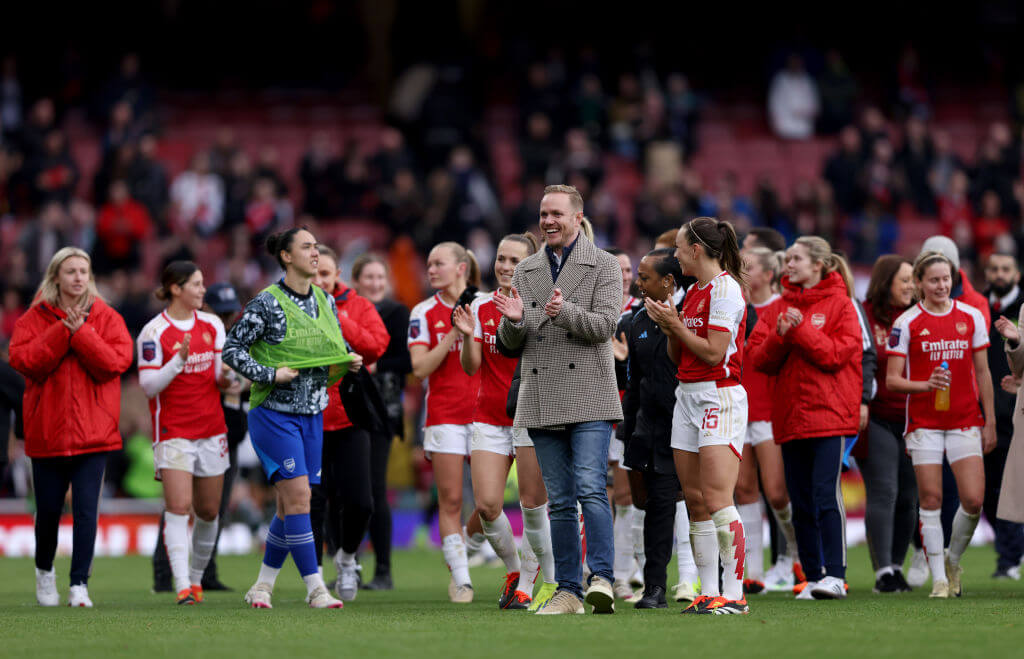
Jonas Eidevall applauds Arsenal fans after beating Manchester United 3-1 at the Emirates. (Paul Harding / Getty Images)
“When you’re at Arsenal and you’re working with the club and those players and those staff, that’s very special. Those are memories you will have with you for life, but it also means: where do you go from doing that?”
If coaching at Arsenal was a corporate job, the NWSL feels more akin to a startup to Eidevall.
“When we look back to this time in the league, you will see this very much was like the startup time, like there’s still a lot of things that you were adding on to, to make it a really professional league and environment,” he said. “That’s also an exciting part about beginning to build something.”
Like a door to his office, the players needed upgrades, too.
“Now here we have a kitchen,” Eidevall said, gesturing to one of the newest containers in the facility, one for cooks to prepare food, “but we built that this year. We were eating on the sofas in the players’ lounge” before having a designated dining space. Both are improvements from the catered food the team was served, which Eidevall said “came with varied quality.”
The scrappy foundations remind him of how he began his coaching career: delivering the morning paper at the pale indigo of dawn to supplement the $50 monthly pay he received, which covered only half of his monthly public transportation fees. Eidevall has distinct memories of lugging team equipment onto city buses because he didn’t have a car. This, too, took place early in the morning so that others on the team wouldn’t see the lengths he had to go through.
“When I’m looking back at it now, it seems crazy,” he admitted. “I’m not going to say I’ve done it all, but I’ve done a lot.”
That’s the perspective he hopes to offer, while also taking advantage of the opportunity to incubate in San Diego.
“I’m very ambitious, but if you really want to be successful, it’s about how do we make other people feel involved, how do we create buy-in,” Eidevall said. “If you don’t feel part of something, it’s really difficult to do that. But that means things have to go a little bit slower.”
He spoke of this with an air of luxury — and perhaps it is for Eidevall, considering how the expectations in his previous coaching roles demanded the opposite.
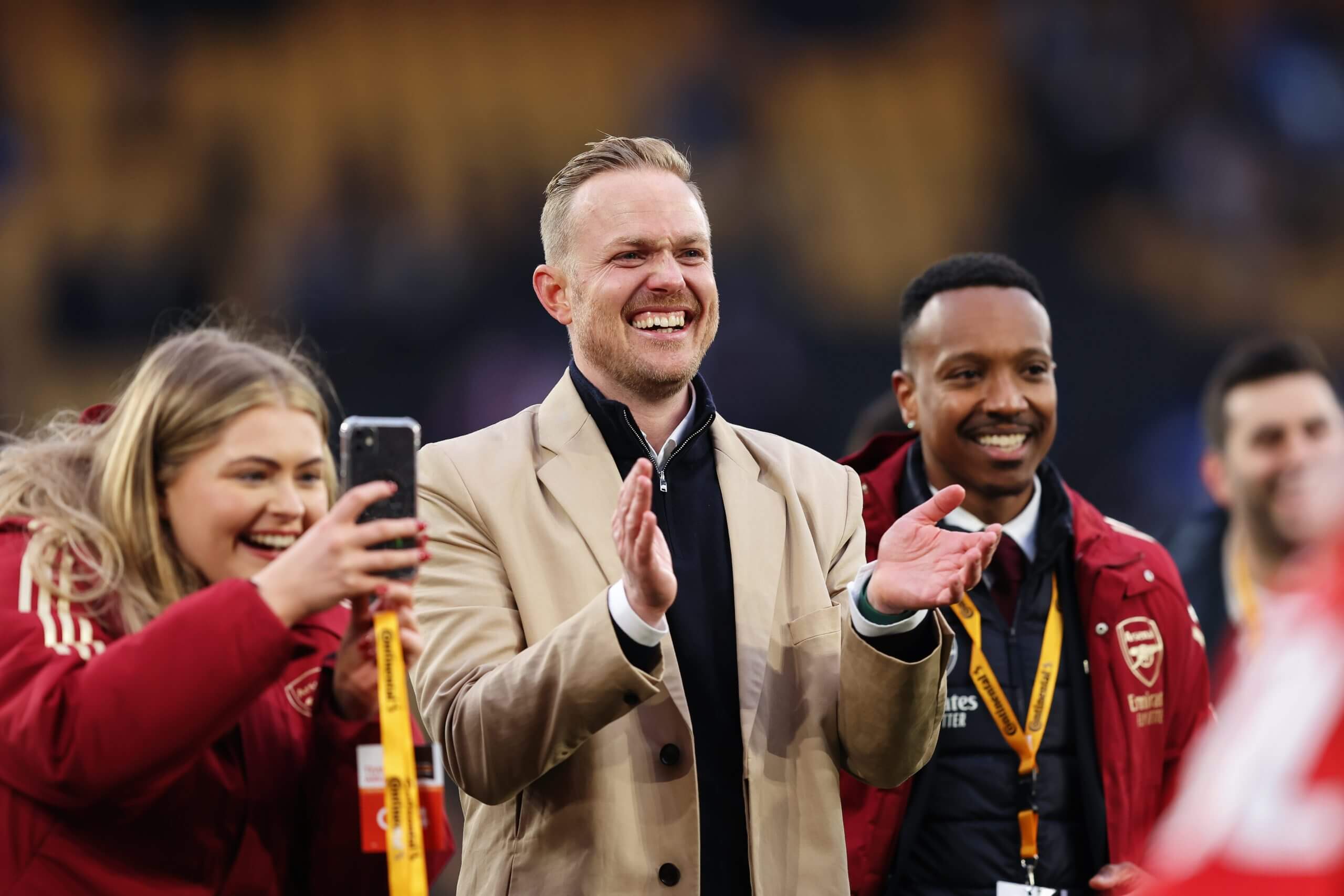
Jonas Eidevall celebrates beating Chelsea to win the 2024 League Cup. (Matt McNulty / Getty Images)
Looking back on his time with Arsenal, Eidevall realizes his response to the pressure borne by those expectations was, at times, a disservice to the players.
“I took a lot of responsibility and accountability in that, but I also took a lot of control,” he said. “A lot of control.” It was a respectable formula, but he wonders now about the sustainability of assuming such a commanding role within a team.
Eidevall has prioritized collaboration with his staff in San Diego, inviting player input early on, but it hasn’t always gone as planned. The team’s 2-0 home loss against the table-topping Kansas City Current in April was instructive. In Eidevall’s mind, it was a match he “took a step backwards as a coach” and allowed the pressure to perform to pull him away from his objectives.
“I saw this Kansas team and all the strengths they had, and I went into it being, like, ‘How do I save my team to get a result in the game?’” he recalled. “I went into it with a game plan that was all in my head, a lot of control, a lot of structure of how we’re gonna deal with these things.” Despite ending the match with a figure of 67 percent possession, the Wave conceded twice within the first 25 minutes and never recovered.
“After the game, I saw a team that looked a bit broken,” Eidevall said, “not because of the results, but because of the feeling that we hadn’t done what we were about, and a group of players that probably felt like they had not been allowed to express themselves that way. They felt a little bit hurt from me, as a coach, not trusting them in that moment.
“They were triggering a lot of fears into me, being like, ‘Are we good enough to do this?’”
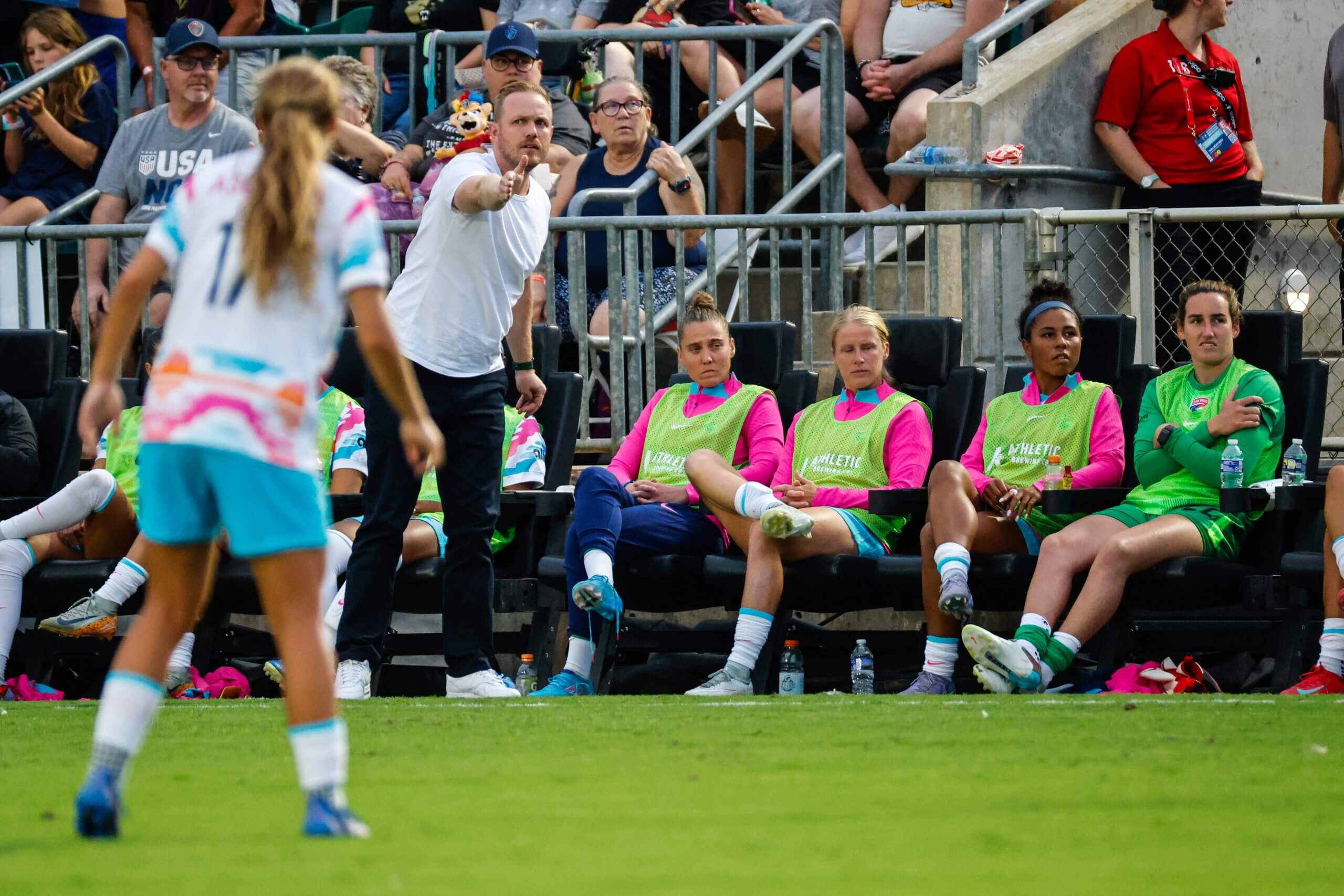
Jonas Eidevall gives instructions during the first half of the 5-2 win against the North Carolina Courage. (Jaylynn Nash / Imagn Images)
Compared to the other teams he has coached, he is using far fewer presentations with the Wave. The whiteboard and crest-colored magnets still emerge on the pitch during training, but Eidevall prefers the fluidity of interchangeable magnets to a rigid deck.
“I have to let them be part of the process,” he said. “It’s such an easy thing to say, ‘We’re going to do it together,’ but here I have my planned PowerPoint with already all the solutions on it.” To then encourage players to speak up would be disingenuous, he believes, and further emphasizes the power imbalance between coach and player.
This has not meant Eidevall offering players the same carte blanche that drew him to Southern California but he is exacting in his expectations. He does not hesitate to make known when players’ executions fall short of that. It is not about ceding control, but creating an environment for exchange where everybody can learn from those around them.
Goalkeeper Kailen Sheridan, who has been with the team since its inception, said the collaboration with Eidevall has been critical in building their relationship.
“Sometimes he’ll be getting into a player on the field in the game, and I’ll look at him and be like, ‘Let me take this one. Let me have it because I can do a better job right now, and I’ll handle this how it should be handled a little bit differently,’” the 30-year-old Canada international told The Athletic.
“Me and him have a better understanding now. I don’t think at the beginning we did, but he has allowed me to take on that responsibility a bit more.”
(Top photo: Daniel Bartel /Getty Images)
